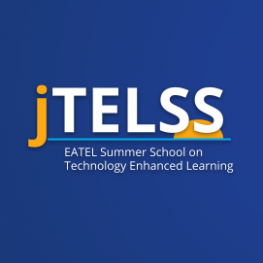Speakers
Fernando Pedro Cardenas-Hernandez
Leibniz Institute for Research and Information in Education - DIPF, GermanyGianluca Romano
Leibniz Institute for Research and Information in Education - DIPF, GermanyStart
27/05/2022 - 10:30
End
27/05/2022 - 12:00
Learning Psychomotor Skills with AI & AR/VR considering Technical and Mental Aspects
Friday 27/05 10:30-12:00h
Main Hall
Abstract
Participants who attend the workshop can expect to learn how technologies such as AR/VR and AI can be used for the learning of psychomotor skills. For the training of psychomotor skills two aspects are highlighted, mental and technical. Regarding the technical aspect, participants will learn about the most common mistakes made by beginners during training, proper instructions and the useful types of technologies to assist in training. Especially the latter will be about the representation of human motion and its assessment. Concerning the mental aspect, a definition and description of what this aspect consists of and its importance in the general training of the athlete will be given. Current state-of-the-art solutions on how mental aspect training is done through VR/AR technology will be presented. The advantages and disadvantages of using VR/AR are also discussed. Participants will also have the opportunity to learn about VR/AR glasses used for mental training.
Needs Analysis
The topics of this workshop are relevant in TEL/EdTech because they deal with how to use technologies to support the training process of psychomotor skills. On the one hand, it explains how to represent human movement with portable devices and evaluate the quality of beginner trainees’ performance in order to teach a proper technique. On the other hand, it comments about how to promote and improve the mental aspect, often ignored but essential for an appropriate training, during the training process through VR/AR.
Since, it is intended to show the progress and potential that these technologies have as interdisciplinary didactic tools, all those doctoral candidates who are interested in knowing how wearable devices, VR/AR and AI are used for training and teaching psychomotor skills, or all those who are looking for inspiration for their current or future projects via new immersive technologies, should attend this workshop.
Learning Objectives
The participants will recognize which are the most relevant elements of technical and mental aspects that must be considered to improve the learning/training of psychomotor skills. They will also learn about the use of wearable sensors for the modeling and evaluation of human movement. In the same way, participants acquire an general understanding about some psychological and learning models that can be used with VR/AR for correct training, as well as some principles of VR/AR. It is expected that by the end of the workshop the participants will know about how to enhance the technique in psychomotor skills and how psychological and learning factors can be trained through VR/AR.
Pre-activities
Pen and paper to brainstorm. Voluntarily, participants might engage in a short physical activity of our choice (go for a short run) before the workshop and we will guide them with some questions to reflect about the activity (e.g. “Could I run longer or faster?” or “how do I feel today?”).
Session Description
In the workshop participants are divided into two groups. One will interactively work on technical and the other on mental aspects for psychomotor skills. Both groups are given a presentation that introduces the usage of technology for mental and technical aspects. The workshop is scheduled for 90 minutes. Here is an overall session description:
- Participants have the chance to get to know each other interactively (5 min)
- Introduction presentation about the usage of AR/VR and AI for the learning of psychomotor learning skills. Mental and technical aspects are presented. (20 min)
- Participants are divided into 2 groups. Each group will interactively participate in the design process of how technologies can be used to learn psychomotor skills. In the workshop the use case for running is presented and discussed. Both groups will work on it from two different points of view. One will be dedicated towards mental and the other towards technical aspects. During the interactive work, intermediate results will be shared and new tasks given. It is foreseen that participants switch groups (45 min)
- There will be a get together with all participants. Results are presented and discussed among all participants (20 min)
Post-activities
Books:
- Learning Theories: An Educational Perspective, 6th Edition, Dale H. Schunk, 2012, Pearson
Bertollo, M., Filho, E., & Terry, P.C. (Eds.). (2020). Advancements in Mental Skills Training (1st ed.). Routledge. https://doi.org/10.4324/9780429025112
Articles:
- Loch, F., Ferrauti, A., Meyer, T., Pfeiffer, M., & Kellmann, M. (2019). Resting the mind – A novel topic with scarce insights. Considering potential mental recovery strategies for short rest periods in sports. Performance Enhancement & Health, 6(3–4), 148–155. https://doi.org/10.1016/j.peh.2019.04.002
- McCormick, A., Meijen, C., Anstiss, P. A., & Jones, H. S. (2019). Self-regulation in endurance sports: theory, research, and practice. International Review of Sport and Exercise Psychology, 12(1), 235–264. https://doi.org/10.1080/1750984X.2018.1469161
- Lindsay Ross-Stewart, Jeffrey Price, Daniel Jackson, & Christopher Hawkins. (2018). A Preliminary Investigation into the Use of an Imagery Assisted Virtual Reality Intervention in Sport. Journal of Sports Science, 6(1). https://doi.org/10.17265/2332-7839/2018.01.003
- Choiri, Much. M., Basuki, A., Bagus, A. Y., Sukaridhoto, S., & Jannah, M. (2017). Design and development virtual reality athletic — Virtual imagery to train sprinter’s concentration. 2017 International Electronics Symposium on Knowledge Creation and Intelligent Computing (IES-KCIC), 161–166. https://doi.org/10.1109/KCIC.2017.8228580
- Luchetti, A., Parolin, E., Butaslac, I., Fujimoto, Y., Kanbara, M., Bosetti, P., Cecco, M. de, & Kato, H. (2020). Stepping over Obstacles with Augmented Reality based on Visual Exproprioception. 2020 IEEE International Symposium on Mixed and Augmented Reality Adjunct (ISMAR-Adjunct), 96–101. https://doi.org/10.1109/ISMAR-Adjunct51615.2020.00039
Websites:
- Virtual Human Interaction LAB, Stanford University: https://stanfordvr.com/
With the learned technical and mental aspects, go for another run !!


